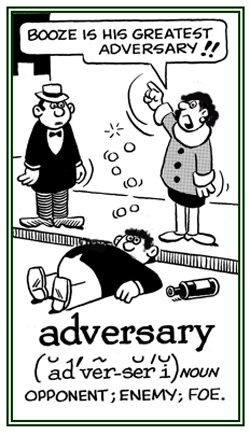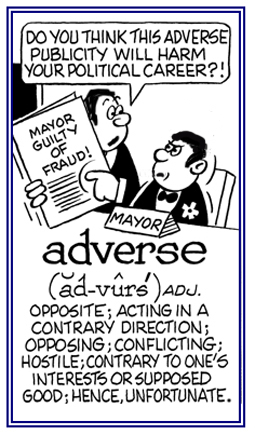ad-
(From Latin: "to, toward, a direction toward, an addition to, near, at"; and changes to: "ac-, af-, ag-, al-, an-, ap-, aq-, ar-, as-, at-" and ad- is also combined with certain words that begin with the letters c, f, g, l, n, p, q, r, s, and t.)
The Latin element ad carries the idea of "in the direction of" and combines with many Latin words and roots to make common English words.
2. The conveyance of an atmospheric property caused by the horizontal movement of air: The transfer of heat, humidity or moisture, or salinity, which are some properties carried through the motion of the air, is known as advection.
3. The horizontal movement of water, as in an ocean current: Advection is important for the precipitation of rain, snow, etc. from clouds, or for the formation of shaping of such orographic clouds.
The layer known as adventitia is a pliable sheet of tissue that overlays, lines, or connects the organs or cells of animals or plants.
2. Regarding something that appears sporadically, or out of the normal place: Jane noticed in her garden that some of the flowers she had planted in the fall were evidently quite adventitious and were suddenly appearing in a completely different spot!
3. Not natural or hereditary; pertaining to a growth in an unexpected place on a plant: Examples of such adventitious developments on organisms are roots that form on stems, an increase of hair where it usually is not found, or the development of a plant in a foreign habitat.
Adventitious roots, shoots, buds, etc. are produced in unusual parts of the plant.
2. A chance occurrence, an event or issue, an accident: Bruce and Sally had an adventure the other day when they drove through the woods, had a flat tire, and met up with a bear!
3. A hazardous or perilous enterprise or performance: Some people seek adventure by racing yachts on wild and dangerous oceans!
4. Any novel or unexpected event in which one shares: When trying to find their way around in the foreign city, Jeffrey and Susan had an adventure of getting lost and then accidentally meeting someone from their home town!
5. The participation in risky, novel, and exciting events; enterprise: The little children were looking forward to going into the garden the first time without their parents and to the adventures awaiting them!
In summary: adverbs tell manner (how), time (when), place (where), degree (how much), and sometimes cause (why).
Adverbs of manner: politely, carefully, not, equally, tenderly.
Adverbs of time: now, then soon, later, early, often.
Adverbs of place: here, there, near, forward, far.
Adverbs of degree: very, so, much, too, extremely, rather.
Adverbs of cause: why, therefore, hence.
2. Etymology: from Anglo-French adverser, from Old French adversier, from Latin adversarius, "opponent, rival"; literally, "turned toward one", from adversus, "turned against".


Go to this Word A Day Revisited Index
so you can see more of Mickey Bach's cartoons.
Adverse winds usually reduce the speed of sailing vessels.
When striving to achieve a worthy objective, everyone should not be discouraged by adverse criticism.
High interest rates are adverse to increasing the sales of houses.
2. Etymology: from Old French avers (Modern French adverse); from Latin adversus, "turned against"; therefore, "hostile"; past participle of advertere, from ad-, "to" + vertere, "to turn".

Go to this Word A Day Revisited Index
so you can see more of Mickey Bach's cartoons.
2. To make something known publicly: There was a job opening in the shop downtown and it was advertised in Monday's newspaper.
2. An opinion about what could or should be done about a situation or problem; to give counsel: Since it was a legal matter, Mike was urged to get a lawyer’s advice before he got involved in the business deal.
4. Formal or official information about something; intelligence, news report: Advice from abroad indicated that war was about to begin.
5. Etymology: from Latin ad-, "to" + visum, past participle of videre, "to see".
Advice is what you get from your parents when you are growing up, and from your children when you are growing old.
It’s a pleasure to give advice, humiliating to need it, normal to ignore it.


